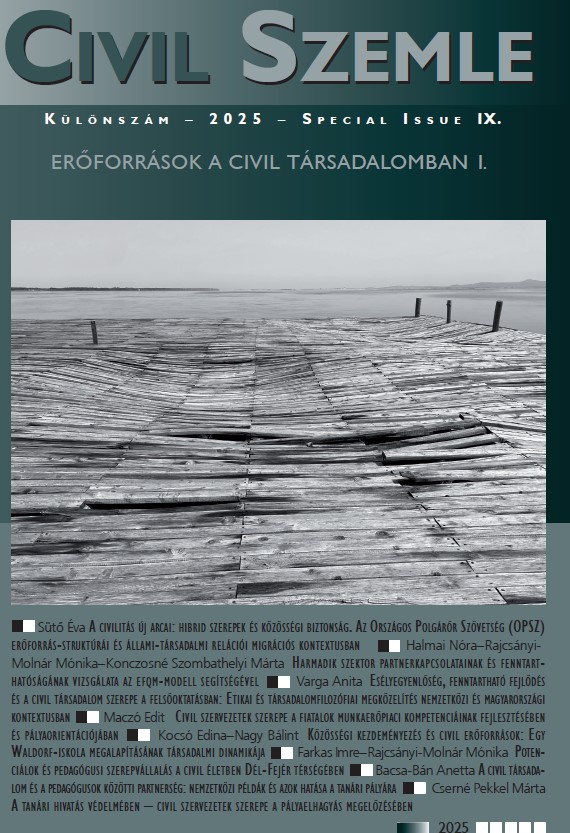The Role of Civil Society Organizations in Developing Young People’s Employability Skills and Career Orientation
Abstract
The rapidly transforming labour market of the 21st century increasingly demands complex, multidimensional competencies from young people. The development of such skills – including problem-solving, collaboration, creative thinking, and social responsibility – is no longer the exclusive domain of formal education systems; rather, civil society organizations (CSOs) are playing an increasingly pivotal role in this process. This paper aims to explore and critically review the role of CSOs in supporting the acquisition of labour market-relevant competencies among youth and in facilitating their career orientation. The analysis is grounded in the growing relevance of non-formal and informal learning environments, which are gaining prominence within the broader paradigm of lifelong learning. The study demonstrates that projects and programs offered by civil society organizations have been proven to contribute to the development of young people’s competencies and professional socialization (European Commission, 2023). Domestic examples, including after-school programmes and youth community initiatives, further underscore how active participation in civil society contributes significantly to the enhancement of young people’s social competencies, leadership capacities, and career-related awareness. The paper concludes that the role of civil society in competence development and career guidance should be regarded as strategically significant in terms of both youth employability and broader societal integration.
References
Aflatoun International (n.d.). Aflatoun International – Child Social and Financial Education. https://aflatoun.org/ (2025.07.02.)
Alekseeva, L. et al. (2021). The demand for AI skills in the labor market. Labour Economics, Vol. 71, pp. 102002.
Allmann, K. (2022). UK digital poverty evidence review 2022. London: Digital Poverty.
BAGázs Public Benefit Association (n.d.). Bagázs Közhasznú Egyesület. European Youth Portal. https://youth.europa.eu/volunteering/organisation/74454_en (2025.07.03.)
Butcher, J., & Curry, G. (2022). Digital poverty as a barrier to access. Widening Participation and Lifelong Learning, 24(2), pp. 180-194.
Cîmpean, M., Găzdac, V., & Bocoș, M. (2023). Developing 21st Century Skills For Secondary School Students Within The Eutourism Project. In I. Albulescu, & C. Stan (Eds.), Education, Reflection, Development - ERD 2022, vol 6. European Proceedings of Educational Sciences (pp. 633-645). European Publisher. https://doi.org/10.15405/epes.23056.59
European Commission (2022). EU Youth Strategy: Work Plan for the EU Youth Strategy 2022–2024. https://youth.europa.eu/strategy_en (2025.07.02.)
European Commission (2023). European Solidarity Corps. Publications Office of the European Union. https://youth.europa.eu/solidarity_en (2025.07.03.)
Eurostat (2020). How usual is it to work from home? Eurostat, Luxembourg. https://ec.europa.eu/eurostat/web/products-eurostat-news/-/DDN-20200424-1 (2025.07.03.)
Eurostat (2023): How many EU people can afford an internet connection? https://ec.europa.eu/eurostat/web/products-eurostat-news/w/edn-20230801-1(2025.07.04.)
Eurostat (2024). Employed persons working from home as a percentage of the total employment, by sex, age and professional status (%). https://ec.europa.eu/eurostat/databrowser/view/lfsa_ehomp/default/table?lang=en&category=labour.employ.lfsa.lfsa_emp (2025.07.02.)
Hischool (2024). Küldetésünk. https://hischool.hu/ (2025.07.03.)
Horváth-Csikós, G., & Juhász, T. (2021). A puha (soft) és a kemény (hard) készségek munkaerőpiaci szükségessége. Educatio, 30(3), 532–542. https://doi.org/10.1556/2063.30.2021.3.13
IFUA Nonprofit Partner. (2016). A BAGázs 16 éves roma fiatalokkal végzett munkájának hatásmérése. https://www.hatasmeres.hu/downloads/IFUA-Nonprofit-Partner_BAGAZS-16-eves-roma-fiatal_HATASMERES-TANULMANY_20161015.pdf (2025.07.03.)
Johnson, M., & Majewska, D. (2021). Formal, non formal and informal learning: What are they, and how can we research them? Cambridge University Press & Assessment Report. doi:10.17863/CAM.110841
Junior Achievement Worldwide (n. d.). JA Worldwide. https://www.jaworldwide.org/ (2025.07.03.)
KézenFogva Alapítvány (n.d.). Támogatott foglalkoztatás – A munkába állás lépései. https://kezenfogva.hu/node/1897 (2025.07.04.)
Kőkuti, T., & Maczó, E. (2024). Mesterséges intelligencia, civil szervezetek és a felsőoktatás. Civil Szemle, 21(5), 107-123. https://doi.org/10.62560/CSZ.2024.05.7
Komenczi, Bertalan (2001): Az Európai Bizottság memoranduma az egész életre kiterjedő tanulásról. http://epa.oszk.hu/00000/00035/00050/2001-06-euKomenczi-Europai.html) (2025.07.01.)
Konnekt Egyesület. (2023). ÉnJövőm Nap – Pályaorientáció fiataloknak. https://konnekt.org/ (2025.07.04.)
Kumar, A., Singh, P. N., Ansari, S. N., & Pandey, S. (2022). Importance of soft skills and its improving factors. World Journal of English Language, 12(3), 220–227. https://doi.org/10.5430/wjel.v12n3p220 (2025.07.02.)
LinkedIn Global Talent Trends (2019). https://business.linkedin.com/talent-solutions/ resources/talent-strategy/global-talent-trends-2019 (2025.07.03.)
Magyar Rajztanárok Országos Egyesülete. (n.d.). Igazgyöngy Alapítvány. https://rajztanarok.hu/partnerek/igazgyongy/#:~:text=foglalkoz%-C3%A1sokat.%20Tanul%C3%B3ink%2070%25,link (2025.07.03.)
McKinsey Report (2024). A new future of work: The race to deploy AI and raise skills in Europe and beyond. (2025.07.02.)
Miller, C., Bos, J., Porter, K., Tseng, F., & Abe, Y. (2018). Laying a foundation: Four-year results from the National YouthBuild evaluation (Report No. ED590015). MDRC. https://files.eric.ed.gov/fulltext/ED590015.pdf (2025.07.02.)
OECD (2021). The Future of Education and Skills: Education 2030. (2025.07.02.)
National Soft Skills Association (2015) Th e Soft Skills Disconnect. https://www. nationalsoftskills.org/the-soft-skills-disconnect/ (2025.07.02.)
Randstad Workmonitor (2024). https://www.randstad.hu/hr-kutatasok/workmonitor/
(2025.07.02.)
Succi, C., & Canovi, M. (2020). Training and developing soft skills in higher education: Evidence from international students’ perceptions. International Journal of Management Education, 18(1), 100-105. https://doi.org/10.1016/j.ijme.2019.100305
UNESCO (2022). Reimagining our futures together: A new social contract for education.
Társadalmi Hatásmérés (2023). Az Igazgyöngy Alapítvány az Impact Academyben. https://tarsadalmihatasmeres.hu/az-igazgyongy-alapitvany-az-impact-academyben/(2025.07.02.)
Technológiai Oktatásért Alapítvány. (n.d.). Skool – A jövő női technológiai alkotóiért. https://skool.org.hu/ (2025.07.04.)
Van Baren, E., Meelen, M., és Meijs, L. C. P. M. (2015). A fiatalok fejlődésének támogatása világszerte: A The Duke of Edinburgh’s International Award program. Journal of Youth Development, 10(1), 151001PA002. https://jyd.pitt.edu/ojs/jyd/article/view/151001PA002
World Economic Forum (2023). Future of Jobs Survey. https://www.weforum.org/publications/the-future-of-jobs-report-2023/digest/ (2025.07.02.)
World Economic Forum. (2025). Future of jobs report 2025: Jobs of the future and the skills you need to get them. https://www.weforum.org/stories/2025/01/future-of-jobs-report-2025-jobs-of-the-future-and-the-skills-you-need-to-get-them/ (2025.07.02.)
Zouali, R., Ben Mustapha, K., & El Ghali, M. (2023). The development of soft skills via in-person training in secondary education: A case study in OujdaAngad Directorate, Morocco. Journal of Employability Skills, 1(1), 115.



